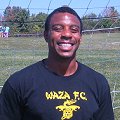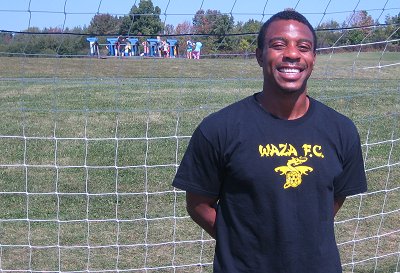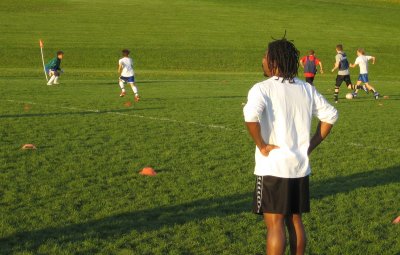- By Dan Veaner
- Sports
 Print
Print  Lansing's Varsity Girls Soccer team is having a great season. "They know it's not going to be easy," says coach LaMarr Peters. "They are gifted in their minds as well as in their bodies. Overall I think they are fantastic spirit beings, and they're open to being taught. That's a unique group. There is something about Lansing that has allowed this group to be."
Lansing's Varsity Girls Soccer team is having a great season. "They know it's not going to be easy," says coach LaMarr Peters. "They are gifted in their minds as well as in their bodies. Overall I think they are fantastic spirit beings, and they're open to being taught. That's a unique group. There is something about Lansing that has allowed this group to be."It is certainly paying off for the girls, who are 12-0, undefeated with only three games left in the regular season. A significant element of a team's success is the coach, and Lansing's team has a unique and driven one. Peters is a professional soccer trainer who came to Lansing after a successful college and pro soccer career. Locally he is known for teaching WAZA FLO, which expands soccer training to include philosophical and spiritual training, a concept borrowed from martial arts.
Peters is originally from Michigan. His soccer career began when his family moved from Pontiac to Auburn Hills when he was eight years old. His parents signed him up for T-Ball, but it didn't work out on the first day because he couldn't catch the ball with a deformed hand.
"Tears! I can't participate in anything," he recalls. "The next day I signed up for soccer. I had never seen, heard... nothing about this game. I went into the elementary school gym, the coach threw some balls out on the floor. I was faster, stronger than everybody. I scored a rediculous amount of goals. Randy Hargreaves, my first coach, walks up to my Dad and says, 'I need this kid on my soccer team.'"
He played club ball, and got onto a travel team at age 10. When he was 11 the general manager and the player coach of the Detroit Express, a North American Soccer League team, decided to start a travel team. Peters lived in their neighborhood a few minutes from the stadium, and he became part of this team.
"I had these professional guys from England as my coaches," he says. "They were neighborhood dads. My friends were all these guys who somehow had dads and uncles who were football fanatics -- soccer, soccer, soccer, soccer in suburban Michigan. You would never know because it was a huge Lions town, Tigers Town, Redwings, Pistons -- all of the big sports were there. But soccer had carved out this niche and I found myself in it."

LaMarr Peters
Peters played football, basketball, and ran track at Birmingham Brother Rice Catholic High School, but his love was soccer. His team made it to the state championship in his senior year. The next day he received a call from the local newspaper saying that he had been named Mr. Soccer of 1988. The day after that he got a call saying he had been named All American. He was thinking about the next step, getting a college soccer scholarship.
After Peters graduated his club team went to Europe for three weeks, playing in Sweden, Holland, Gremany, and France. At that time the Swedish Gothia Cup was the biggest youth tournament in the world at the time. Peter's team was one of the first American teams to get to the quarter finals before they were beaten by a Danish team. Soccer wasn't a major sport in America, but it was huge in Europe. Peters and his teammates were thinking about college soccer while their European opponents were aiming for pro teams.
"You put us in that situation 20 years later and half my team wouldn't have come back," Peters says. "We all would have stayed and tried to catch on with a team there, because we were good enough to compete with their teams. It was the best soccer experience that an 18 year old could have."
Peters says he decided to go to collage at the University of North Carolina at Chapel Hill because it was the number one public school in the country at that time. Coach Anson Dorrance had shown interest in the young Peters when he attended soccer camp there before his senior year in high school. But Dorrance was feeling over burdened, and shortly before Peters got to North Carolina he had dropped the boys team to concentrate on coaching the girls, where Mia Hamm and Kristine Lilly were on the team .
Elmar Bolowich was elevated from assistant to head coach of the boys, and for whatever reason Peters and Bolowich couldn't connect. Peters was recovering from an injury, and also dropped an iron on his foot. These injuries kept him out of the game for a year as Bolowich let him 'red shirt' -- he could practice with the team and keep his eligibility, but he didn't play in games. The coach convinced him to stay in North Carolina instead of going back to Michigan to play for the summer, but never put Peters on the roster. Bolowich took the team to Germany for pre-season play, but again left Peters behind.
"My whole life was just spinning," Peters says. "It was the first time in my life where anything had been taken away. Soccer was my refuge where my deformed hand didn't matter. It didn't matter that I was the only African American kid playing. The game was part of who I was. I was floundering."
When he was kept out of the lineup in his Sophomore year, Peters and Bolowich parted ways. Peters stayed at Chapel Hill, but concentrated on academics. An acting class helped him restore his confidence, but by the next academic year he traded college for the library, getting jobs to survive and spending any time he could reading everything from black history to ancient Rome to quantum physics.
By December he was ready to get back into the game. Friends told him to call Gary Parsons, the coach at Oakland University in Rochester, Michigan. Parsons' team was making it to the playoffs every year, and a lot of the players from Peters' Michigan club team days were there. In February Parsons recruited him to begin playing in the Fall.
In 1994 the team made it to the national championships. "My soccer life was back," he says. "I was a different player. I played angry. I was a dangerous soccer player. I was playing like I would never play again. It was therapy."
In 1991 Peters and some of his friends started a company to teach technique to other club teams. They called it Soccer WAZA. Waza is the Japanese word for 'technique.' They made an acronym of it that stood for Wisdom, Awareness, Zen Application. They added a second acronym, FLO, which stood for Fulfillment, Liberation, Oneness."
"We wanted to coach around the interests that we had," he says. "We all loved martial arts and we all loved Eastern philosophy. So now these soccer coaches were teaching kids rudimentary concepts of martial arts, along with meditation, yoga, Tai Chi, deep breathing, and how as an individual you are in control of your environment, your body and your spirit. It was a way to calm ourselves down. Because to this day we are pretty high strung dudes. I mean intense, intense, intense individuals!"
After taking the LSAT in 1995, he decided to quit school. He tried out for the local professional indoor team, but didn't make the cut. Soon after his best friend moved to Washington, D.C. for school and Peters decided to go along. There he became a personal fitness trainer at the Washington Sports Club. He soon became the go-to guy in fitness, training CNN reporters, and White House staffers, and running fitness boot camps.
But in 1998 he wanted to go back to soccer. Major League Soccer had started in 1996 and the Mid Michigan Bucks was a United Soccer Leagues Premier Development League (PDL) team. Peters joined the team, which went on to win the division championship, making it to the quarter finals in 1999.
When the season finished Peters went back to Washington to play for the Eastern Shore Sharks, a Division 3 farm team for the D.C. United. Midway through the season he got himself traded back to the Mid Michigan Bucks, which went on to win the division championship again.
In 2000 Peters went to Malta with his best friend, whose father happened to be Maltese. "It's a little rock of a country a hundred miles south of Sicily," he recalls. "We trained the professional team, the Sliema Wanderers in Malta. And I was reading 'War and Peace.' That's how I spent the winter of '99 and 2000."
In 2001 he played with the Detroit Rockers, a professional indoor soccer team. But at the end of that season the league folded, and Detroit didn't keep a soccer franchise. Then 9/11 happened. "I met my wife a month before 9/11," he recalls. "I was coaching a junior college team in Michigan."
Havana was from Ovid, visiting family. She planned to go back to New York City, but Peters had other plans for her. He picked her up in Ovid and brought her back to Michigan the next day. In 2001 the couple came to Lansing, where they met Mike Cheatham, Tom Keane, Ned LaCelle, and Mike Herzog, all very active with kids in Lansing Soccer Club soccer. But at the time there wasn't enough work here for Peters to support himself coaching soccer. The Peters soon moved to Chicago where Peters coached soccer for three years. But Havana wanted to live in upstate New York. Peters knew The FIELD was on this side of the lake, and that drew him to Lansing, where they have lived since.

Coaching a Lansing Soccer Club team in 2006
When they got back to Lansing Cheatham, Keane, LaCelle, and Herzog helped Peters get established. The soccer club hired Peters to coach some of their teams, and he began to get private training work as well. He established some WAZA FLO teams within the club.
He says they started out taking a beating, losing every game in that first season. But three years later they were the league champs. Now WAZA teams win championships regularly. He has coached three U12 teams to the national indoor championships. The first group finished fifth. Last winter his teams won indoor tournaments in Marcellus. Last summer his U12 group came in second at the Hall of Fame tournament in Oneonta.
"I knew when I came back that I wanted it to be more than what it was in Chicago," he says. "I didn't want to just give kids the information. I wanted to replicate what was going on in Michigan. Soccer WAZA the training company became the WAZA FLO Club. I wanted to have kids playing and wearing the WAZA jersey. I was going to have my forum to discuss whatever was going to work for them in their lives. Kids know they are getting something more than just soccer."
In 2005 and 2006 Peters was Adam Heck's assistant coach on Lansing's varsity boys team. Now Peters got to work with older kids who were training every day, offering the kind of intensity he loves. "To this day I am eternally grateful to Adam," Peters says. "He allowed me space to come in and be me with his team."
Two years ago he became the head coach for the girls team. At the moment they are the #1 ranked team in the state. "Because I get them every day the varsity girl team is a WAZA team," he says. "They put it out the way I envision it if I could train the young kids every day. These girls get the WAZA philosophy. They're old enough to understand the teachings. They get it like our college teams in Michigan used to get it. You get me in your face every day. They exemplify it more than any group of kids I've ever been around. They're hungry for it."
That is the kind of hunger Peters understands. Get him talking about his varsity girls and it's not easy to get him to stop. "They're fantastic," he enthuses. "Every day I talk about these girls to somebody back home. I feel bonded to them in a way that I haven't felt with another team."
----
v4i38




